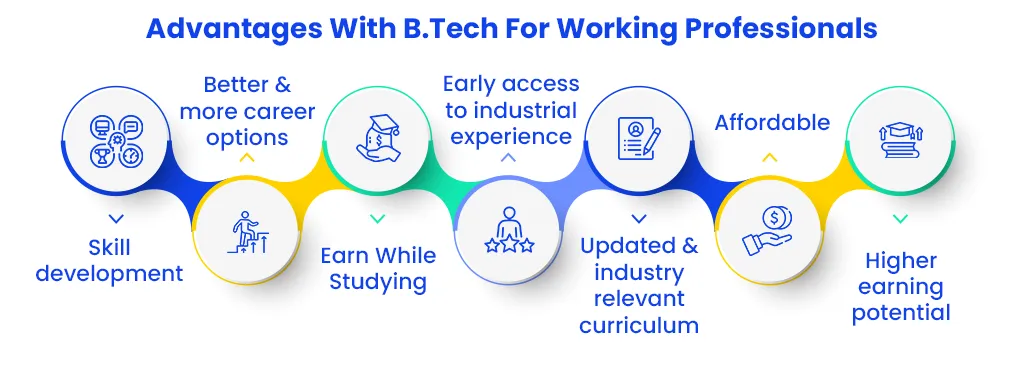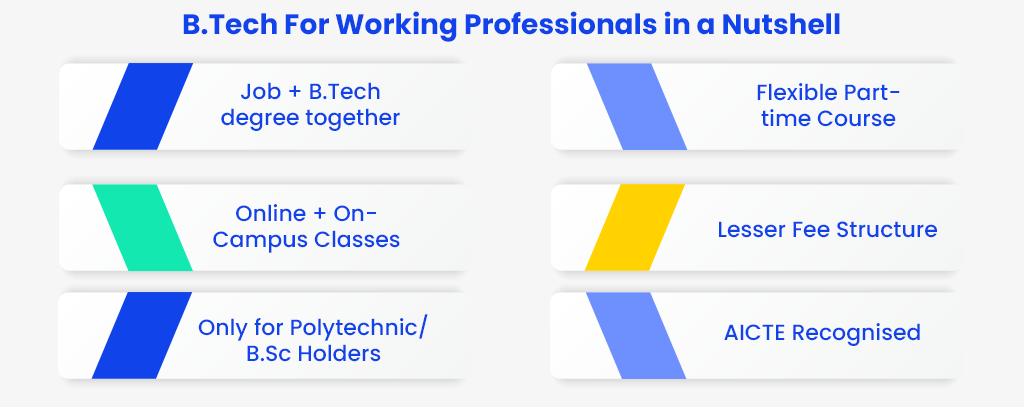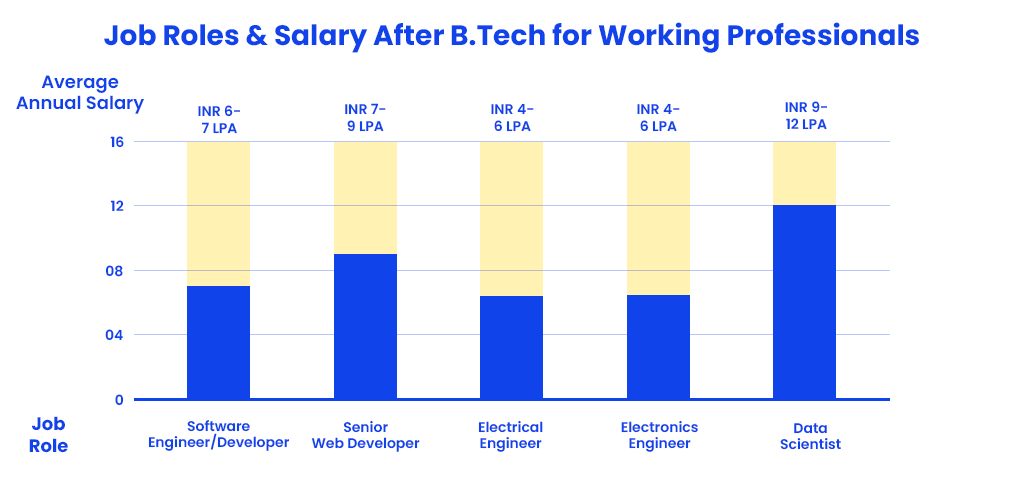Expert Interviews
- University Reviews
- Career Guide
 Video Counseling
Video CounselingImportant Facts
- Ask any Question - CV Forum

Why to Pursue B.Tech After B.Sc? - Data Science, AI & ML
College Vidya Team Feb 4, 2025 3.7K Reads

If you have finished your B.Sc degree but are still struggling to land your desired job, it may be time to consider upskilling yourself. Pursuing engineering after B.Sc is one of the best ways to do this. However, it's important to note that pursuing a traditional B.Tech degree may not be the best option as it is a 4-year undergraduate course. You can rather pursue a B.Tech for working professionals program which is a 3-year program and designed with an industry-relevant curriculum to elevate your chances to a better career in Computer Science Engineering.
This blog provides a comprehensive guide on how to pursue B.Tech after completing a B.Sc degree in a way that maximises career growth in your desired field of engineering. It outlines the key strategies and insider tips to succeed in this field in the shortest amount of time possible. Make sure to read this blog until the end to discover how and where to apply for the program, as well as to dispel any myths or misconceptions you may have about the process.
Why is B.Tech After B.Sc the Best Choice?
BSc programs are typically more theoretical and focus on the fundamentals of science and mathematics, while B.Tech programs are more practical and focus on the application of scientific and engineering principles.
A B.Tech degree is your gateway to the field of engineering. After completing your B.Sc degree, if you have still not been able to find the right career path, then engineering is something you should look forward to. If fields like data science and analytics, cyber security, artificial intelligence, machine learning, etc interest you, then a B.Tech in Computer Science and Engineering might be the perfect option for you.
In today's job market, academic qualifications are no longer the sole determinant of employability. Employers seek individuals who not only possess academic proficiency but also practical experience in their respective fields. This has led to increased demand for individuals who possess both expertise and experience in their fields.
As a result, it is crucial to pursue a B.Tech program after completing a B.Sc degree in a manner that optimises your potential for success in the shortest possible time.
Benefits of Pursuing B.Tech for Working Professionals After B.Sc?
Rather than pursuing a traditional 4-year B.Tech degree, you can go for a BTech for working professionals program. Since you have completed your B.Sc degree, you are eligible for BTech lateral entry, and so a 3-year B.Tech for working professionals is just the right pick because it is not only lesser in duration but also the curriculum is more industry-specific.
If you are a fresh B.Sc graduate or a working professional with a B.Sc degree, this course is beneficial for you. The program focuses on industry collaborations to offer hands-on industry experience to the students. The flexibility of the program allows students (who are not currently working), the opportunity to pursue internships/jobs/projects simultaneously with the course to gain practical experience. With this flexibility, you have the opportunity to gain deeper insights

If you are currently employed, you can pursue the B.Tech for working professionals program in a specialisation relevant to your B.Sc degree while continuing to work. This enables you to gain practical experience while also completing the B.Tech program in the most efficient manner possible.
The BTech for working professionals program is designed to help individuals who are currently employed and wish to further their education in their chosen fields. This program provides a comprehensive curriculum that covers essential topics in the field, while also allowing students to continue working. By pursuing this program, individuals can upgrade their skills and qualifications, enhancing their career prospects in the field.
What is B.Tech for Working Professionals?
The B.Tech for working professionals program is an undergraduate engineering program tailored for individuals who are presently employed but aspire to earn an engineering degree. The program is designed to offer a flexible and convenient schedule, allowing students to balance their work and education effectively. This enables individuals to acquire the knowledge and skills needed to advance their careers while also fulfilling their professional responsibilities.
However, students who are not employed but have completed their B.Sc degree or a polytechnic diploma are also eligible to apply for this direct second year engineering program.
The B.Tech for working professionals course is a hybrid program that involves a combination of online and on-campus learning. However, it is important to note that this program should not be confused with distance B.Tech programs, which are not recognized by the All India Council for Technical Education (AICTE).
Unlike distance B.Tech programs, the B.Tech for working professionals program is recognized by the AICTE and is not considered a distance learning program. The online mode of learning in this program is designed to provide flexibility for working professionals, while the on-campus component allows for hands-on learning and practical experience.

In order to accommodate the schedules of working professionals, classes for the B.Tech for working professionals program are typically held in the evenings, on weekends, and holidays. The program often utilises a blended learning approach, with some classes held online (usually for theory-based subjects) and others held offline on campus for practical components.
Additionally, some B.Tech for working professionals programs may offer accelerated options, allowing students to complete the program in a shorter timeframe than traditional on-campus students. This can be a great advantage for those who wish to complete the program quickly while balancing work and other commitments.
B.Tech for working professionals programs generally cover the same fundamental curriculum as traditional B.Tech programs, which includes courses in mathematics, physics, computer science, and engineering.
In addition to these core courses, B.Tech for working professionals programs may also offer specialised courses or concentrations in areas such as software engineering, cybersecurity, or data science. These courses are designed to provide students with practical knowledge and skills that are in high demand in today's job market. By offering specialised courses, B.Tech for working professionals programs help students to develop expertise in specific areas and become more competitive in the job market.
Why B.Tech for Working Professionals After B.Sc?
Pursuing a Bachelor of Technology (B.Tech) degree after a Bachelor of Science (B.Sc) degree can provide a number of benefits, depending on the individual's career goals and interests. Here are a few reasons why someone might choose to pursue a B.Tech degree after completing a B.Sc:
- Diversify skill set: B.Tech programs typically focus on applied science and technology, while B.Sc programs tend to be more theoretical. By pursuing a B.Tech degree, individuals can gain practical skills and knowledge that can be applied in a wide range of industries.
- Career prospects: In many industries, having a B.Tech degree can give individuals a competitive edge in the job market. This is especially true in fields such as engineering, computer science, and information technology, where a B.Tech degree is often a requirement for certain positions.
- Higher earning potential: According to data from the US Bureau of Labor Statistics, individuals with a B.Tech degree tend to earn higher salaries on average than those with a B.Sc degree. This is particularly true in fields such as engineering and computer science.
- Professional development: Pursuing a B.Tech degree can provide opportunities for professional development, such as internships, research projects, and networking events. These experiences can help individuals build their resumes, make connections in their field, and gain valuable experience that can be applied in their careers.
Ultimately, the decision to pursue a B.Tech degree after completing a B.Sc degree will depend on the individual's goals and interests. It's important to carefully consider the potential benefits and drawbacks of pursuing additional education before making a decision.
Top Colleges for B.Tech for Working Professionals
It's crucial to choose the right college or university to pursue a B.Tech for working professionals program in Computer Science Engineering after completing your B.Sc degree. When we say the right college or university, we mean one that is recognized by the All India Council for Technical Education (AICTE), which is a statutory body that governs technical education in India.

By choosing an AICTE-recognized college or university, you can be assured that the quality of education provided will be up to the mark and the degree you earn will be recognized by employers in the industry. It's also essential to research the college's faculty, facilities, placement records, and industry connections before enrolling in a B.Tech for working professionals program to ensure that you get the best possible education and career prospects.
In addition to the accreditations and recognitions, it is important to consider the facilities and resources offered by the university. This includes a strong digital infrastructure to support online learning, an industry-relevant curriculum that covers the latest trends and technologies in the field of Computer Science Engineering, essential exposure to practical applications through internships and projects, experienced faculty who can guide and mentor the students, and placement assistance services to help students secure job opportunities after completing the program.
Here are a few of the best universities in India known to offer B.Tech for working professionals programs are:
- BITS Pilani WILP
- Lingaya’s Vidyapeeth Engineering
- Glocal University Engineering
- Shri Venkateshwara University (SVU) Engineering
- Sanskriti University
- Apex University
- Mangalayatan University
Eligibility Criteria for B.Tech for After Completion Your B.Sc Degree
The eligibility criteria for B.Tech for Working Professionals program may vary from university to university, but generally, candidates must have completed a 3-year diploma in engineering or a 3-year B.Sc. degree with Mathematics as one of the subjects. They must have also obtained a minimum percentage or CGPA as prescribed by the university. In addition, candidates must have a minimum number of years of work experience as specified by the university. This work experience requirement is usually around 2-3 years.
To add to that, candidates should have completed their B.Sc degree in a relevant field such as Computer Science, Information Technology, Electronics, or Mathematics. Additionally, some universities may also require candidates to have some work experience in the relevant field. It is important to check the specific eligibility criteria of the university or institute where you plan to apply.
While work experience is preferred, it is not always mandatory for admission to the B.Tech for Working Professionals program. The program is open to all candidates who meet the eligibility criteria, including recent B.Sc graduates who do not have work experience. However, having work experience can be an added advantage as it can bring practical knowledge and industry insights to the classroom.
Syllabus for B.Tech Course After B.Sc Degree
The B.Tech for working professionals program is for a period of 3-3.5 years which includes a total of 6-7 semesters. The syllabus for the program varies depending on the specialisation you choose for your B.Tech degree. The syllabus includes the major core subjects and a few elective subjects. Students get to choose electives from a wide range of topics. The students also have to finish a project and submit it in the final semester of the program.
Fee Structure of B.Tech for Working Professionals After B.Sc
The fees for B.Tech programs for working professionals vary among universities, depending on several factors such as the quality of facilities and laboratory experiences offered, as well as the length of the course. Typically, the total cost falls within the range of INR 2 to 3 lakhs. To obtain the exact fee structure of different universities, you may check College Vidya and compare them.
Job Role & Salary After B.Tech Engineering Degree
Pursuing B.Tech after B.Sc is a great decision and specially if you are a working professional who is also pursuing a B.Tech program for working professionals, you can reap significant benefits such as being promoted from your current job role to mid-level or senior-level positions.

The job role that you get depends on the discipline in which you are pursuing through your B.Tech degree. Given below are some of the job roles that you can pursue after completing your B.Tech after B.Sc along with their average salaries.
|
Job Role |
Average Annual Salary |
|
Software Engineer/Developer |
INR 6-7 LPA |
|
Senior Web Developer |
INR 7-9 LPA |
|
Electrical Engineer |
INR 4-6 LPA |
|
Electronics Engineer |
INR 4-6 LPA |
|
Data Scientist |
INR 9-12 LPA |
Summing Up
Opting for a B.Tech program following a B.Sc degree can be an excellent choice for career advancement. However, it is imperative to have relevant experience. To enhance your career growth, enrolling in a B.Tech program for working professionals after completing your B.Sc can prove to be beneficial. It is crucial to select the appropriate university to pursue this course. At College Vidya, you will only find government-approved universities offering B.Tech programs for working professionals. Here, you can access all the necessary information and effortlessly compare various colleges to make an informed decision.
FAQs (Frequently Asked Questions)
Yes, you can pursue a B.Tech program after completing your B.Sc. B.Tech lateral entry programs allow B.Sc graduates to start their B.Tech program directly from the second year.
If the student has already completed a B.Sc program, then they can get lateral admission to the B.Tech program and so the total duration will reduce to 3-3.5 years.
Yes, the B.Tech for working professionals is a flexible program that helps you earn an engineering degree without having to leave your job.
Comparing B.Tech and B.Sc degrees is not straightforward, as they are both very different programs with different focuses and career outcomes. If you are interested in pursuing a career in engineering, computer science, or information technology, then a B.Tech degree may be a better fit for you. If you’re more interested in pursuing a career in research, education, or healthcare, then a B.Sc degree may be a better fit.

Idea Alchemist / Concept Creator / Insight Generator
We are an online education platform where users can compare 100+ online universities on 30+ X-factors in just 2 minutes. With an active CV community, we have transformed online learning to quite an extent. With the CV Subsidy scheme, we contributing to GER in India while helping our learners with their finances in their “Chuno Apna Sahi” journey!
Every query is essential.
Our team of experts, or experienced individuals, will answer it within 24 hours.
Recommended for you
Tired of dealing with call centers!
Get a professional advisor for Career!
LIFETIME FREE
Rs.1499(Exclusive offer for today)

Pooja
MBA 7 yrs exp

Sarthak
M.Com 4 yrs exp

Kapil Gupta
MCA 5 yrs exp
or



Career Finder
(Career Suitability Test)
Explore and Find out your Most Suitable Career Path. Get Started with our Career Finder Tool Now!
ROI Calculator
Find out the expected salary, costs, and ROI of your chosen online university with our free calculator.
